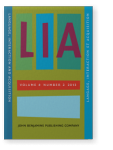Vol. 4:2 (2013) ► pp.256–290
Exploring the upper limits of the Aspect Hypothesis
Tense-aspect morphology in the advanced English L2 variety
This paper explores coalitions between tense-aspect morphology and the aspectual class of predicates in second language acquisition (the Aspect Hypothesis) on the basis of 36 oral narratives elicited with a picture book from French L1 adult learners of English. The observed distributional patterns are analysed in relation to the prototypical inflection/predicate coalitions observed both at early stages of L2 development and in English L1. While advanced learners are expected to make a productive use of tense-aspect morphology within all predicate classes, our data indicate that the prototypical coalition between the progressive form and activity predicates remains strong until very proficient stages of English L2, when the distribution of verb morphology within this class eventually becomes more flexible and activities as a class are predominantly encoded in the non-progressive present or past form. Non-grammaticalisation of the progressive in the learners’ L1 may interfere with the predictions of the Aspect Hypothesis for this form in English L2.
Cited by
Cited by 10 other publications
This list is based on CrossRef data as of 4 june 2024. Please note that it may not be complete. Sources presented here have been supplied by the respective publishers. Any errors therein should be reported to them.
